Fundamentals of Evidence-Based Practice: Report and Literature Review
VerifiedAdded on 2023/01/11
|13
|5051
|27
Report
AI Summary
This report delves into the fundamentals of evidence-based practice (EBP) within healthcare and social care, using a case study of a 79-year-old patient in a London care home. It explores the critical role of research, both qualitative and quantitative, in informing EBP, emphasizing the importance of analytical, time management, and evaluative skills in conducting literature reviews. The report includes a detailed literature review on tackling neglect and abuse in healthcare settings, analyzing sources to identify the prevalence of these issues in the UK, their impact on patient outcomes, and potential strategies for improvement. The review covers definitions of abuse and neglect, historical cases, and the importance of training and intervention. The report highlights the significance of ethical considerations, such as empathy and leadership, in conducting research and implementing EBP, contributing to the broader understanding of patient care and healthcare practices. The report is contributed by a student on Desklib, a platform providing AI-based study tools.
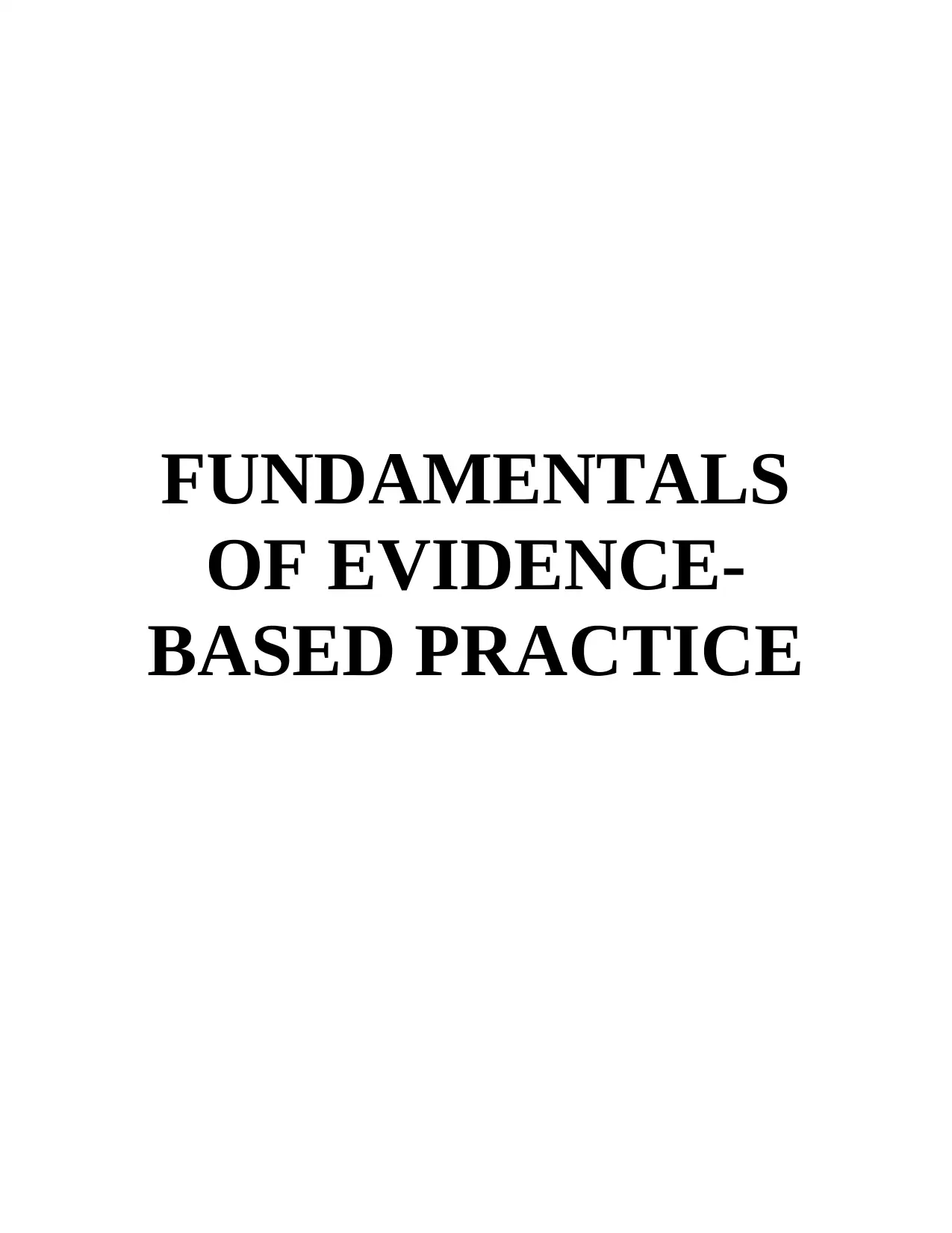
FUNDAMENTALS
OF EVIDENCE-
BASED PRACTICE
OF EVIDENCE-
BASED PRACTICE
Paraphrase This Document
Need a fresh take? Get an instant paraphrase of this document with our AI Paraphraser
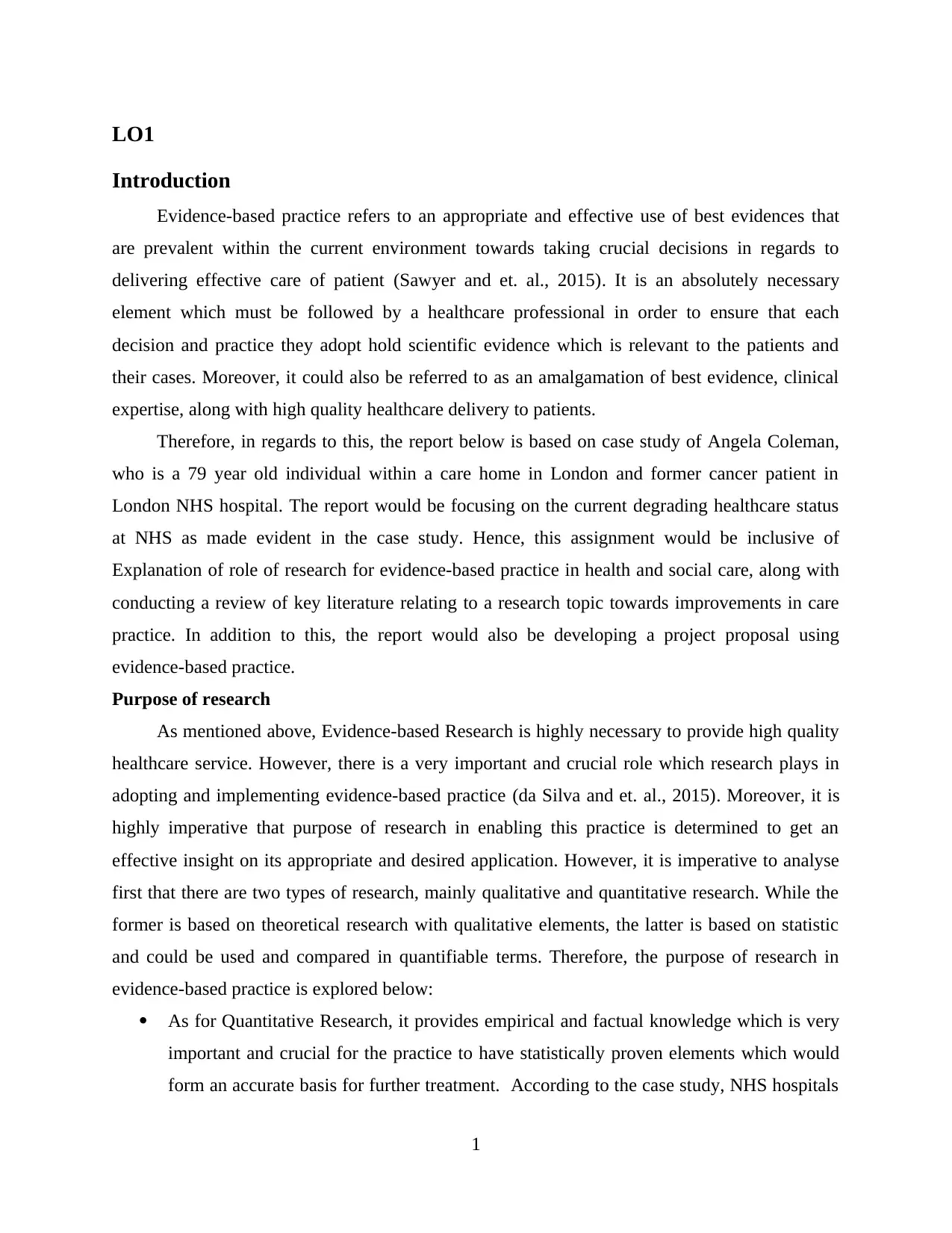
LO1
Introduction
Evidence-based practice refers to an appropriate and effective use of best evidences that
are prevalent within the current environment towards taking crucial decisions in regards to
delivering effective care of patient (Sawyer and et. al., 2015). It is an absolutely necessary
element which must be followed by a healthcare professional in order to ensure that each
decision and practice they adopt hold scientific evidence which is relevant to the patients and
their cases. Moreover, it could also be referred to as an amalgamation of best evidence, clinical
expertise, along with high quality healthcare delivery to patients.
Therefore, in regards to this, the report below is based on case study of Angela Coleman,
who is a 79 year old individual within a care home in London and former cancer patient in
London NHS hospital. The report would be focusing on the current degrading healthcare status
at NHS as made evident in the case study. Hence, this assignment would be inclusive of
Explanation of role of research for evidence-based practice in health and social care, along with
conducting a review of key literature relating to a research topic towards improvements in care
practice. In addition to this, the report would also be developing a project proposal using
evidence-based practice.
Purpose of research
As mentioned above, Evidence-based Research is highly necessary to provide high quality
healthcare service. However, there is a very important and crucial role which research plays in
adopting and implementing evidence-based practice (da Silva and et. al., 2015). Moreover, it is
highly imperative that purpose of research in enabling this practice is determined to get an
effective insight on its appropriate and desired application. However, it is imperative to analyse
first that there are two types of research, mainly qualitative and quantitative research. While the
former is based on theoretical research with qualitative elements, the latter is based on statistic
and could be used and compared in quantifiable terms. Therefore, the purpose of research in
evidence-based practice is explored below:
As for Quantitative Research, it provides empirical and factual knowledge which is very
important and crucial for the practice to have statistically proven elements which would
form an accurate basis for further treatment. According to the case study, NHS hospitals
1
Introduction
Evidence-based practice refers to an appropriate and effective use of best evidences that
are prevalent within the current environment towards taking crucial decisions in regards to
delivering effective care of patient (Sawyer and et. al., 2015). It is an absolutely necessary
element which must be followed by a healthcare professional in order to ensure that each
decision and practice they adopt hold scientific evidence which is relevant to the patients and
their cases. Moreover, it could also be referred to as an amalgamation of best evidence, clinical
expertise, along with high quality healthcare delivery to patients.
Therefore, in regards to this, the report below is based on case study of Angela Coleman,
who is a 79 year old individual within a care home in London and former cancer patient in
London NHS hospital. The report would be focusing on the current degrading healthcare status
at NHS as made evident in the case study. Hence, this assignment would be inclusive of
Explanation of role of research for evidence-based practice in health and social care, along with
conducting a review of key literature relating to a research topic towards improvements in care
practice. In addition to this, the report would also be developing a project proposal using
evidence-based practice.
Purpose of research
As mentioned above, Evidence-based Research is highly necessary to provide high quality
healthcare service. However, there is a very important and crucial role which research plays in
adopting and implementing evidence-based practice (da Silva and et. al., 2015). Moreover, it is
highly imperative that purpose of research in enabling this practice is determined to get an
effective insight on its appropriate and desired application. However, it is imperative to analyse
first that there are two types of research, mainly qualitative and quantitative research. While the
former is based on theoretical research with qualitative elements, the latter is based on statistic
and could be used and compared in quantifiable terms. Therefore, the purpose of research in
evidence-based practice is explored below:
As for Quantitative Research, it provides empirical and factual knowledge which is very
important and crucial for the practice to have statistically proven elements which would
form an accurate basis for further treatment. According to the case study, NHS hospitals
1
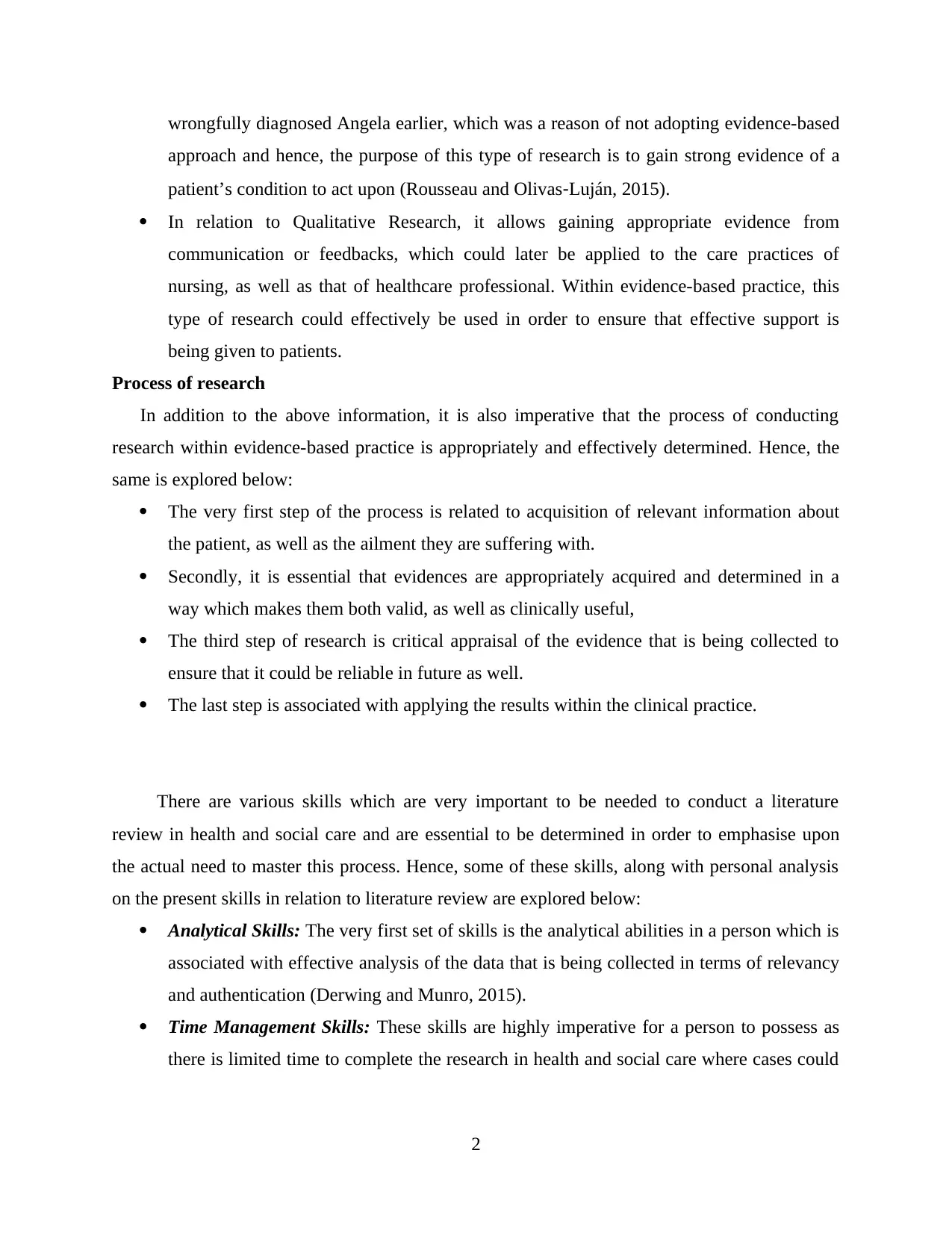
wrongfully diagnosed Angela earlier, which was a reason of not adopting evidence-based
approach and hence, the purpose of this type of research is to gain strong evidence of a
patient’s condition to act upon (Rousseau and Olivas‐Luján, 2015).
In relation to Qualitative Research, it allows gaining appropriate evidence from
communication or feedbacks, which could later be applied to the care practices of
nursing, as well as that of healthcare professional. Within evidence-based practice, this
type of research could effectively be used in order to ensure that effective support is
being given to patients.
Process of research
In addition to the above information, it is also imperative that the process of conducting
research within evidence-based practice is appropriately and effectively determined. Hence, the
same is explored below:
The very first step of the process is related to acquisition of relevant information about
the patient, as well as the ailment they are suffering with.
Secondly, it is essential that evidences are appropriately acquired and determined in a
way which makes them both valid, as well as clinically useful,
The third step of research is critical appraisal of the evidence that is being collected to
ensure that it could be reliable in future as well.
The last step is associated with applying the results within the clinical practice.
There are various skills which are very important to be needed to conduct a literature
review in health and social care and are essential to be determined in order to emphasise upon
the actual need to master this process. Hence, some of these skills, along with personal analysis
on the present skills in relation to literature review are explored below:
Analytical Skills: The very first set of skills is the analytical abilities in a person which is
associated with effective analysis of the data that is being collected in terms of relevancy
and authentication (Derwing and Munro, 2015).
Time Management Skills: These skills are highly imperative for a person to possess as
there is limited time to complete the research in health and social care where cases could
2
approach and hence, the purpose of this type of research is to gain strong evidence of a
patient’s condition to act upon (Rousseau and Olivas‐Luján, 2015).
In relation to Qualitative Research, it allows gaining appropriate evidence from
communication or feedbacks, which could later be applied to the care practices of
nursing, as well as that of healthcare professional. Within evidence-based practice, this
type of research could effectively be used in order to ensure that effective support is
being given to patients.
Process of research
In addition to the above information, it is also imperative that the process of conducting
research within evidence-based practice is appropriately and effectively determined. Hence, the
same is explored below:
The very first step of the process is related to acquisition of relevant information about
the patient, as well as the ailment they are suffering with.
Secondly, it is essential that evidences are appropriately acquired and determined in a
way which makes them both valid, as well as clinically useful,
The third step of research is critical appraisal of the evidence that is being collected to
ensure that it could be reliable in future as well.
The last step is associated with applying the results within the clinical practice.
There are various skills which are very important to be needed to conduct a literature
review in health and social care and are essential to be determined in order to emphasise upon
the actual need to master this process. Hence, some of these skills, along with personal analysis
on the present skills in relation to literature review are explored below:
Analytical Skills: The very first set of skills is the analytical abilities in a person which is
associated with effective analysis of the data that is being collected in terms of relevancy
and authentication (Derwing and Munro, 2015).
Time Management Skills: These skills are highly imperative for a person to possess as
there is limited time to complete the research in health and social care where cases could
2
⊘ This is a preview!⊘
Do you want full access?
Subscribe today to unlock all pages.

Trusted by 1+ million students worldwide
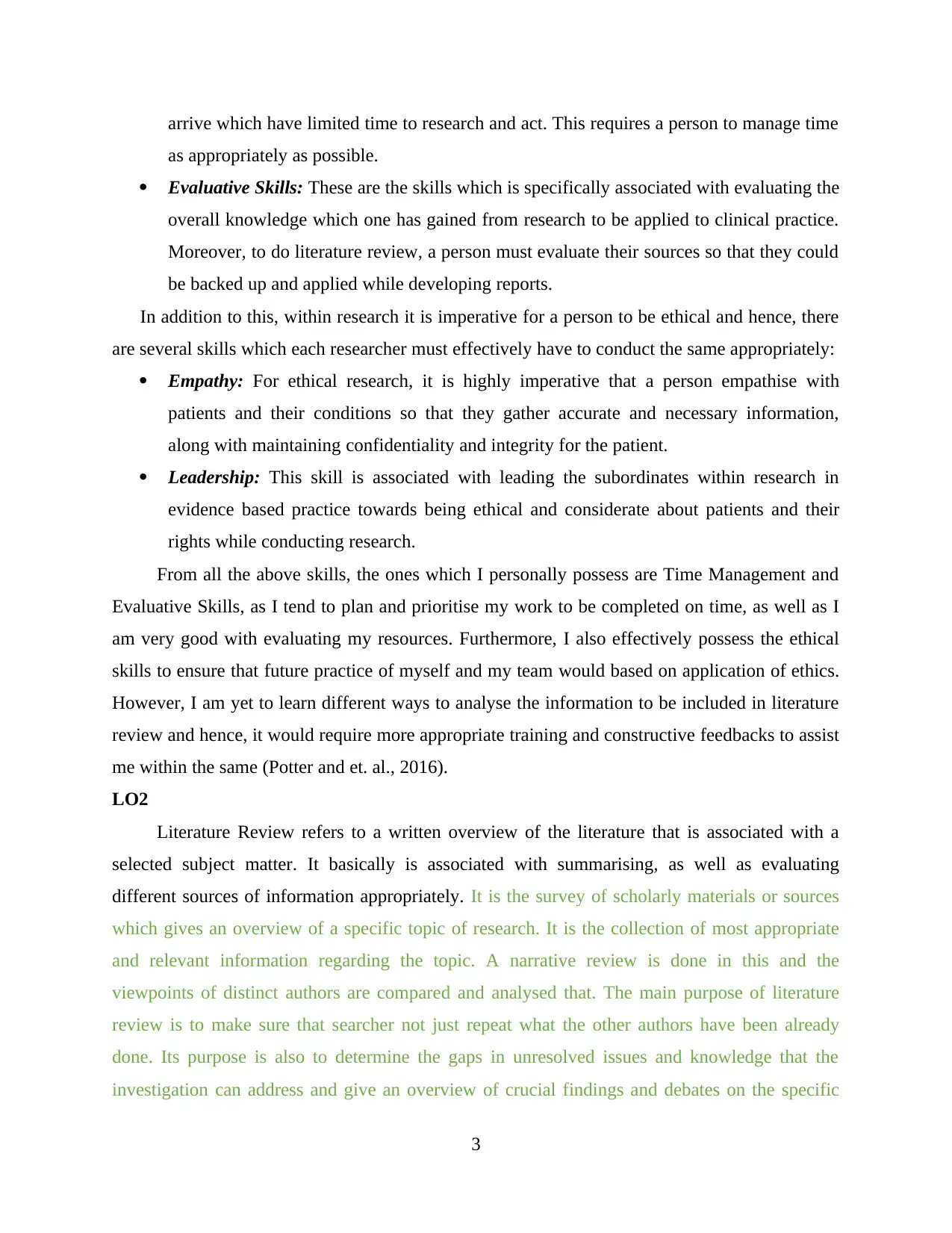
arrive which have limited time to research and act. This requires a person to manage time
as appropriately as possible.
Evaluative Skills: These are the skills which is specifically associated with evaluating the
overall knowledge which one has gained from research to be applied to clinical practice.
Moreover, to do literature review, a person must evaluate their sources so that they could
be backed up and applied while developing reports.
In addition to this, within research it is imperative for a person to be ethical and hence, there
are several skills which each researcher must effectively have to conduct the same appropriately:
Empathy: For ethical research, it is highly imperative that a person empathise with
patients and their conditions so that they gather accurate and necessary information,
along with maintaining confidentiality and integrity for the patient.
Leadership: This skill is associated with leading the subordinates within research in
evidence based practice towards being ethical and considerate about patients and their
rights while conducting research.
From all the above skills, the ones which I personally possess are Time Management and
Evaluative Skills, as I tend to plan and prioritise my work to be completed on time, as well as I
am very good with evaluating my resources. Furthermore, I also effectively possess the ethical
skills to ensure that future practice of myself and my team would based on application of ethics.
However, I am yet to learn different ways to analyse the information to be included in literature
review and hence, it would require more appropriate training and constructive feedbacks to assist
me within the same (Potter and et. al., 2016).
LO2
Literature Review refers to a written overview of the literature that is associated with a
selected subject matter. It basically is associated with summarising, as well as evaluating
different sources of information appropriately. It is the survey of scholarly materials or sources
which gives an overview of a specific topic of research. It is the collection of most appropriate
and relevant information regarding the topic. A narrative review is done in this and the
viewpoints of distinct authors are compared and analysed that. The main purpose of literature
review is to make sure that searcher not just repeat what the other authors have been already
done. Its purpose is also to determine the gaps in unresolved issues and knowledge that the
investigation can address and give an overview of crucial findings and debates on the specific
3
as appropriately as possible.
Evaluative Skills: These are the skills which is specifically associated with evaluating the
overall knowledge which one has gained from research to be applied to clinical practice.
Moreover, to do literature review, a person must evaluate their sources so that they could
be backed up and applied while developing reports.
In addition to this, within research it is imperative for a person to be ethical and hence, there
are several skills which each researcher must effectively have to conduct the same appropriately:
Empathy: For ethical research, it is highly imperative that a person empathise with
patients and their conditions so that they gather accurate and necessary information,
along with maintaining confidentiality and integrity for the patient.
Leadership: This skill is associated with leading the subordinates within research in
evidence based practice towards being ethical and considerate about patients and their
rights while conducting research.
From all the above skills, the ones which I personally possess are Time Management and
Evaluative Skills, as I tend to plan and prioritise my work to be completed on time, as well as I
am very good with evaluating my resources. Furthermore, I also effectively possess the ethical
skills to ensure that future practice of myself and my team would based on application of ethics.
However, I am yet to learn different ways to analyse the information to be included in literature
review and hence, it would require more appropriate training and constructive feedbacks to assist
me within the same (Potter and et. al., 2016).
LO2
Literature Review refers to a written overview of the literature that is associated with a
selected subject matter. It basically is associated with summarising, as well as evaluating
different sources of information appropriately. It is the survey of scholarly materials or sources
which gives an overview of a specific topic of research. It is the collection of most appropriate
and relevant information regarding the topic. A narrative review is done in this and the
viewpoints of distinct authors are compared and analysed that. The main purpose of literature
review is to make sure that searcher not just repeat what the other authors have been already
done. Its purpose is also to determine the gaps in unresolved issues and knowledge that the
investigation can address and give an overview of crucial findings and debates on the specific
3
Paraphrase This Document
Need a fresh take? Get an instant paraphrase of this document with our AI Paraphraser
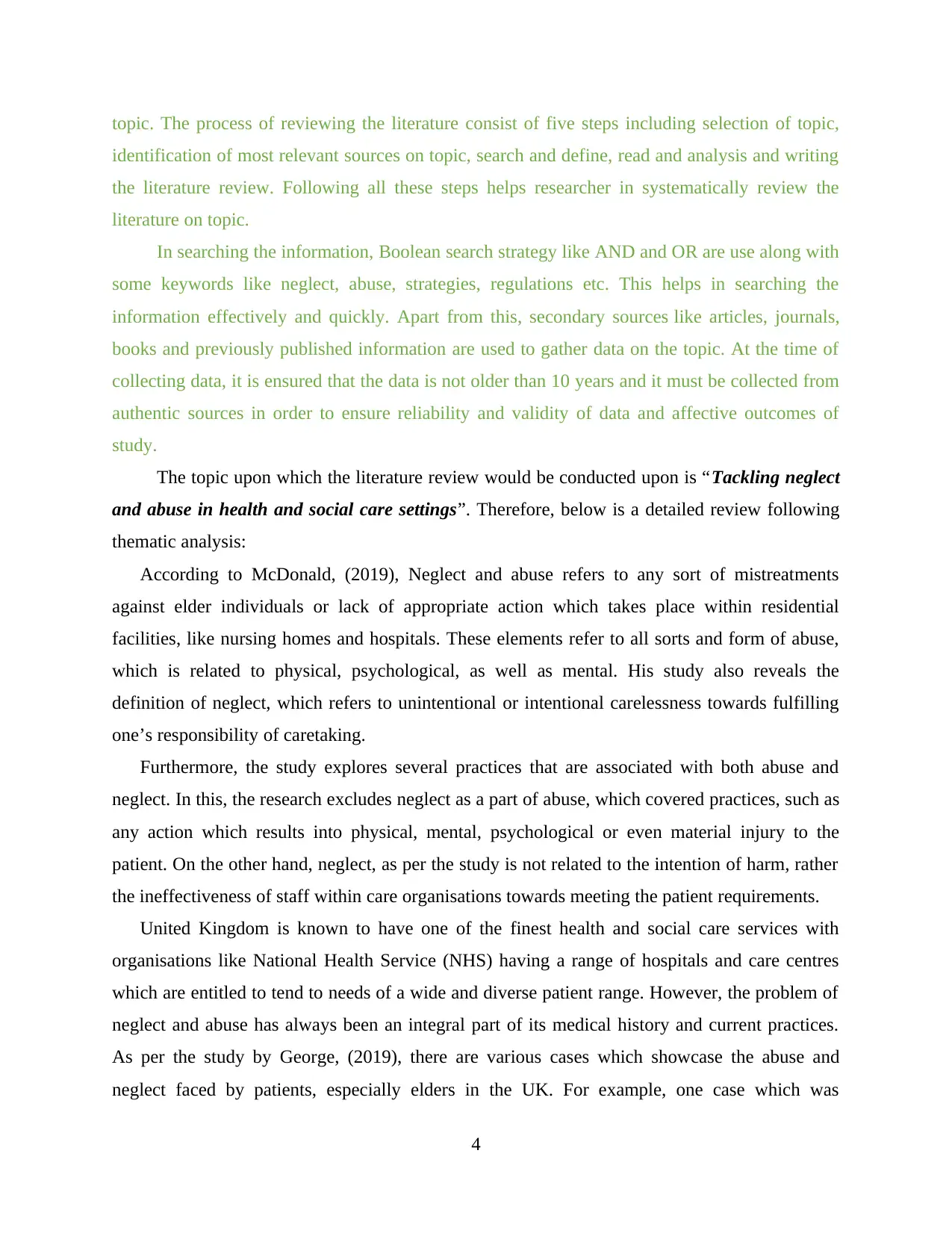
topic. The process of reviewing the literature consist of five steps including selection of topic,
identification of most relevant sources on topic, search and define, read and analysis and writing
the literature review. Following all these steps helps researcher in systematically review the
literature on topic.
In searching the information, Boolean search strategy like AND and OR are use along with
some keywords like neglect, abuse, strategies, regulations etc. This helps in searching the
information effectively and quickly. Apart from this, secondary sources like articles, journals,
books and previously published information are used to gather data on the topic. At the time of
collecting data, it is ensured that the data is not older than 10 years and it must be collected from
authentic sources in order to ensure reliability and validity of data and affective outcomes of
study.
The topic upon which the literature review would be conducted upon is “Tackling neglect
and abuse in health and social care settings”. Therefore, below is a detailed review following
thematic analysis:
According to McDonald, (2019), Neglect and abuse refers to any sort of mistreatments
against elder individuals or lack of appropriate action which takes place within residential
facilities, like nursing homes and hospitals. These elements refer to all sorts and form of abuse,
which is related to physical, psychological, as well as mental. His study also reveals the
definition of neglect, which refers to unintentional or intentional carelessness towards fulfilling
one’s responsibility of caretaking.
Furthermore, the study explores several practices that are associated with both abuse and
neglect. In this, the research excludes neglect as a part of abuse, which covered practices, such as
any action which results into physical, mental, psychological or even material injury to the
patient. On the other hand, neglect, as per the study is not related to the intention of harm, rather
the ineffectiveness of staff within care organisations towards meeting the patient requirements.
United Kingdom is known to have one of the finest health and social care services with
organisations like National Health Service (NHS) having a range of hospitals and care centres
which are entitled to tend to needs of a wide and diverse patient range. However, the problem of
neglect and abuse has always been an integral part of its medical history and current practices.
As per the study by George, (2019), there are various cases which showcase the abuse and
neglect faced by patients, especially elders in the UK. For example, one case which was
4
identification of most relevant sources on topic, search and define, read and analysis and writing
the literature review. Following all these steps helps researcher in systematically review the
literature on topic.
In searching the information, Boolean search strategy like AND and OR are use along with
some keywords like neglect, abuse, strategies, regulations etc. This helps in searching the
information effectively and quickly. Apart from this, secondary sources like articles, journals,
books and previously published information are used to gather data on the topic. At the time of
collecting data, it is ensured that the data is not older than 10 years and it must be collected from
authentic sources in order to ensure reliability and validity of data and affective outcomes of
study.
The topic upon which the literature review would be conducted upon is “Tackling neglect
and abuse in health and social care settings”. Therefore, below is a detailed review following
thematic analysis:
According to McDonald, (2019), Neglect and abuse refers to any sort of mistreatments
against elder individuals or lack of appropriate action which takes place within residential
facilities, like nursing homes and hospitals. These elements refer to all sorts and form of abuse,
which is related to physical, psychological, as well as mental. His study also reveals the
definition of neglect, which refers to unintentional or intentional carelessness towards fulfilling
one’s responsibility of caretaking.
Furthermore, the study explores several practices that are associated with both abuse and
neglect. In this, the research excludes neglect as a part of abuse, which covered practices, such as
any action which results into physical, mental, psychological or even material injury to the
patient. On the other hand, neglect, as per the study is not related to the intention of harm, rather
the ineffectiveness of staff within care organisations towards meeting the patient requirements.
United Kingdom is known to have one of the finest health and social care services with
organisations like National Health Service (NHS) having a range of hospitals and care centres
which are entitled to tend to needs of a wide and diverse patient range. However, the problem of
neglect and abuse has always been an integral part of its medical history and current practices.
As per the study by George, (2019), there are various cases which showcase the abuse and
neglect faced by patients, especially elders in the UK. For example, one case which was
4
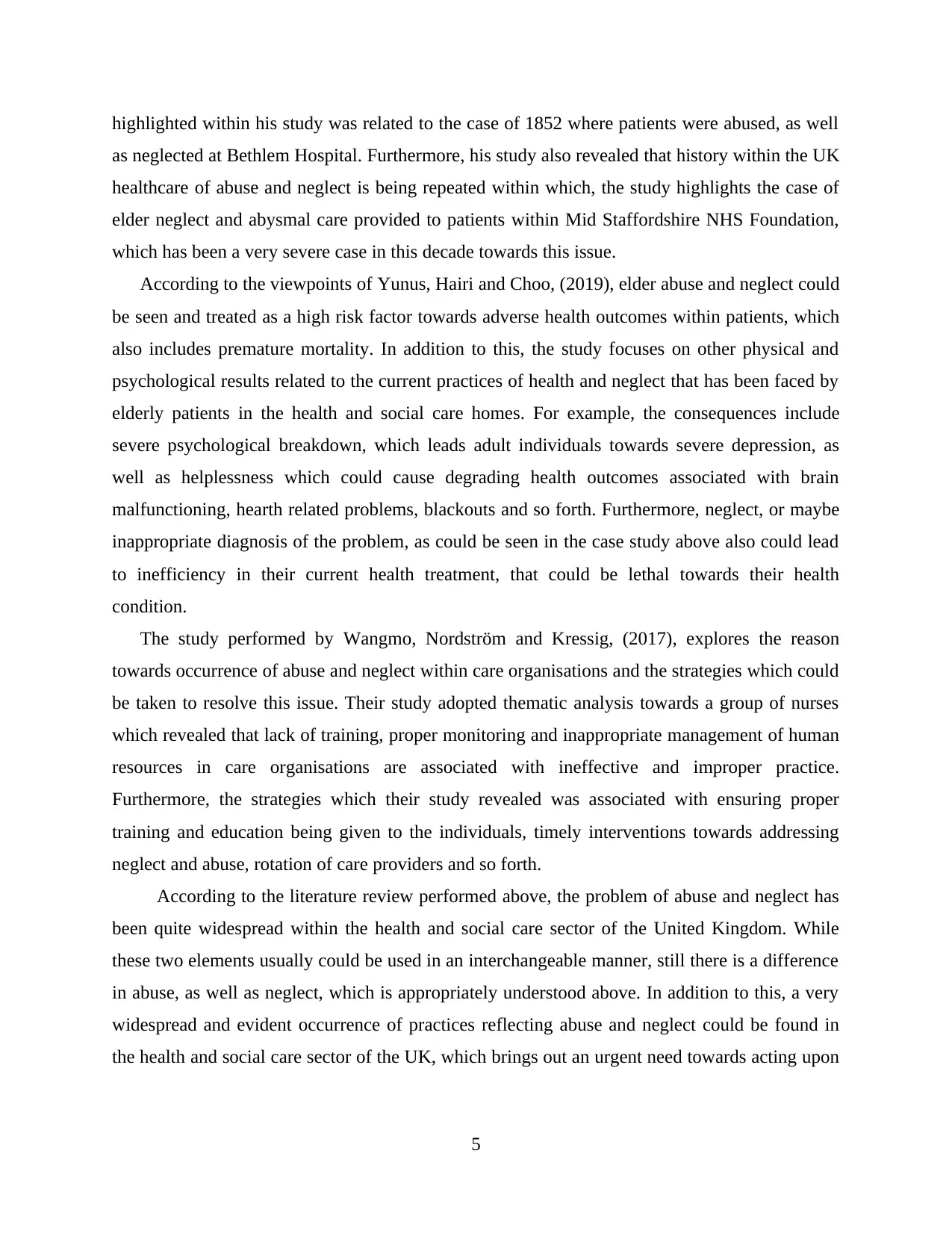
highlighted within his study was related to the case of 1852 where patients were abused, as well
as neglected at Bethlem Hospital. Furthermore, his study also revealed that history within the UK
healthcare of abuse and neglect is being repeated within which, the study highlights the case of
elder neglect and abysmal care provided to patients within Mid Staffordshire NHS Foundation,
which has been a very severe case in this decade towards this issue.
According to the viewpoints of Yunus, Hairi and Choo, (2019), elder abuse and neglect could
be seen and treated as a high risk factor towards adverse health outcomes within patients, which
also includes premature mortality. In addition to this, the study focuses on other physical and
psychological results related to the current practices of health and neglect that has been faced by
elderly patients in the health and social care homes. For example, the consequences include
severe psychological breakdown, which leads adult individuals towards severe depression, as
well as helplessness which could cause degrading health outcomes associated with brain
malfunctioning, hearth related problems, blackouts and so forth. Furthermore, neglect, or maybe
inappropriate diagnosis of the problem, as could be seen in the case study above also could lead
to inefficiency in their current health treatment, that could be lethal towards their health
condition.
The study performed by Wangmo, Nordström and Kressig, (2017), explores the reason
towards occurrence of abuse and neglect within care organisations and the strategies which could
be taken to resolve this issue. Their study adopted thematic analysis towards a group of nurses
which revealed that lack of training, proper monitoring and inappropriate management of human
resources in care organisations are associated with ineffective and improper practice.
Furthermore, the strategies which their study revealed was associated with ensuring proper
training and education being given to the individuals, timely interventions towards addressing
neglect and abuse, rotation of care providers and so forth.
According to the literature review performed above, the problem of abuse and neglect has
been quite widespread within the health and social care sector of the United Kingdom. While
these two elements usually could be used in an interchangeable manner, still there is a difference
in abuse, as well as neglect, which is appropriately understood above. In addition to this, a very
widespread and evident occurrence of practices reflecting abuse and neglect could be found in
the health and social care sector of the UK, which brings out an urgent need towards acting upon
5
as neglected at Bethlem Hospital. Furthermore, his study also revealed that history within the UK
healthcare of abuse and neglect is being repeated within which, the study highlights the case of
elder neglect and abysmal care provided to patients within Mid Staffordshire NHS Foundation,
which has been a very severe case in this decade towards this issue.
According to the viewpoints of Yunus, Hairi and Choo, (2019), elder abuse and neglect could
be seen and treated as a high risk factor towards adverse health outcomes within patients, which
also includes premature mortality. In addition to this, the study focuses on other physical and
psychological results related to the current practices of health and neglect that has been faced by
elderly patients in the health and social care homes. For example, the consequences include
severe psychological breakdown, which leads adult individuals towards severe depression, as
well as helplessness which could cause degrading health outcomes associated with brain
malfunctioning, hearth related problems, blackouts and so forth. Furthermore, neglect, or maybe
inappropriate diagnosis of the problem, as could be seen in the case study above also could lead
to inefficiency in their current health treatment, that could be lethal towards their health
condition.
The study performed by Wangmo, Nordström and Kressig, (2017), explores the reason
towards occurrence of abuse and neglect within care organisations and the strategies which could
be taken to resolve this issue. Their study adopted thematic analysis towards a group of nurses
which revealed that lack of training, proper monitoring and inappropriate management of human
resources in care organisations are associated with ineffective and improper practice.
Furthermore, the strategies which their study revealed was associated with ensuring proper
training and education being given to the individuals, timely interventions towards addressing
neglect and abuse, rotation of care providers and so forth.
According to the literature review performed above, the problem of abuse and neglect has
been quite widespread within the health and social care sector of the United Kingdom. While
these two elements usually could be used in an interchangeable manner, still there is a difference
in abuse, as well as neglect, which is appropriately understood above. In addition to this, a very
widespread and evident occurrence of practices reflecting abuse and neglect could be found in
the health and social care sector of the UK, which brings out an urgent need towards acting upon
5
⊘ This is a preview!⊘
Do you want full access?
Subscribe today to unlock all pages.

Trusted by 1+ million students worldwide
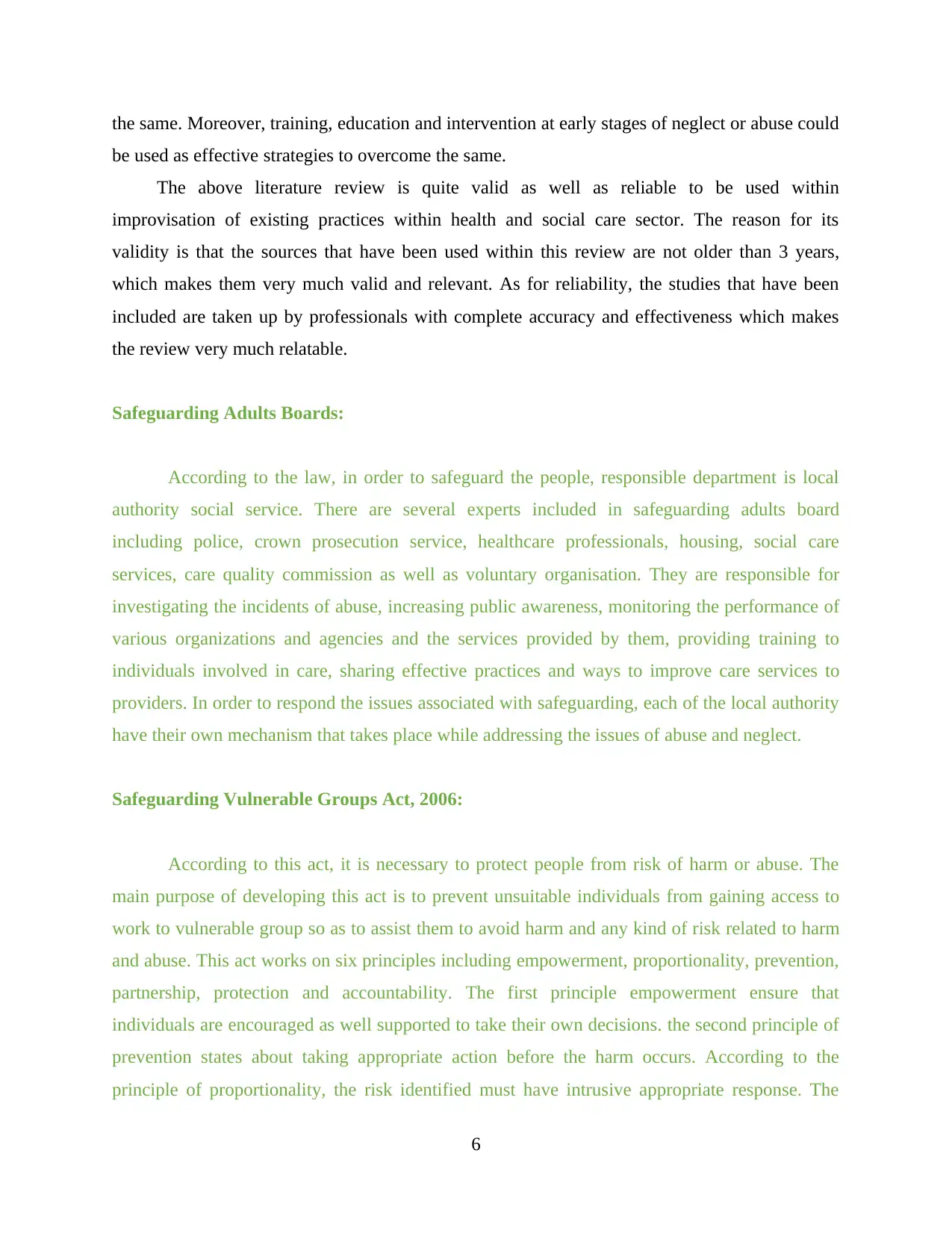
the same. Moreover, training, education and intervention at early stages of neglect or abuse could
be used as effective strategies to overcome the same.
The above literature review is quite valid as well as reliable to be used within
improvisation of existing practices within health and social care sector. The reason for its
validity is that the sources that have been used within this review are not older than 3 years,
which makes them very much valid and relevant. As for reliability, the studies that have been
included are taken up by professionals with complete accuracy and effectiveness which makes
the review very much relatable.
Safeguarding Adults Boards:
According to the law, in order to safeguard the people, responsible department is local
authority social service. There are several experts included in safeguarding adults board
including police, crown prosecution service, healthcare professionals, housing, social care
services, care quality commission as well as voluntary organisation. They are responsible for
investigating the incidents of abuse, increasing public awareness, monitoring the performance of
various organizations and agencies and the services provided by them, providing training to
individuals involved in care, sharing effective practices and ways to improve care services to
providers. In order to respond the issues associated with safeguarding, each of the local authority
have their own mechanism that takes place while addressing the issues of abuse and neglect.
Safeguarding Vulnerable Groups Act, 2006:
According to this act, it is necessary to protect people from risk of harm or abuse. The
main purpose of developing this act is to prevent unsuitable individuals from gaining access to
work to vulnerable group so as to assist them to avoid harm and any kind of risk related to harm
and abuse. This act works on six principles including empowerment, proportionality, prevention,
partnership, protection and accountability. The first principle empowerment ensure that
individuals are encouraged as well supported to take their own decisions. the second principle of
prevention states about taking appropriate action before the harm occurs. According to the
principle of proportionality, the risk identified must have intrusive appropriate response. The
6
be used as effective strategies to overcome the same.
The above literature review is quite valid as well as reliable to be used within
improvisation of existing practices within health and social care sector. The reason for its
validity is that the sources that have been used within this review are not older than 3 years,
which makes them very much valid and relevant. As for reliability, the studies that have been
included are taken up by professionals with complete accuracy and effectiveness which makes
the review very much relatable.
Safeguarding Adults Boards:
According to the law, in order to safeguard the people, responsible department is local
authority social service. There are several experts included in safeguarding adults board
including police, crown prosecution service, healthcare professionals, housing, social care
services, care quality commission as well as voluntary organisation. They are responsible for
investigating the incidents of abuse, increasing public awareness, monitoring the performance of
various organizations and agencies and the services provided by them, providing training to
individuals involved in care, sharing effective practices and ways to improve care services to
providers. In order to respond the issues associated with safeguarding, each of the local authority
have their own mechanism that takes place while addressing the issues of abuse and neglect.
Safeguarding Vulnerable Groups Act, 2006:
According to this act, it is necessary to protect people from risk of harm or abuse. The
main purpose of developing this act is to prevent unsuitable individuals from gaining access to
work to vulnerable group so as to assist them to avoid harm and any kind of risk related to harm
and abuse. This act works on six principles including empowerment, proportionality, prevention,
partnership, protection and accountability. The first principle empowerment ensure that
individuals are encouraged as well supported to take their own decisions. the second principle of
prevention states about taking appropriate action before the harm occurs. According to the
principle of proportionality, the risk identified must have intrusive appropriate response. The
6
Paraphrase This Document
Need a fresh take? Get an instant paraphrase of this document with our AI Paraphraser
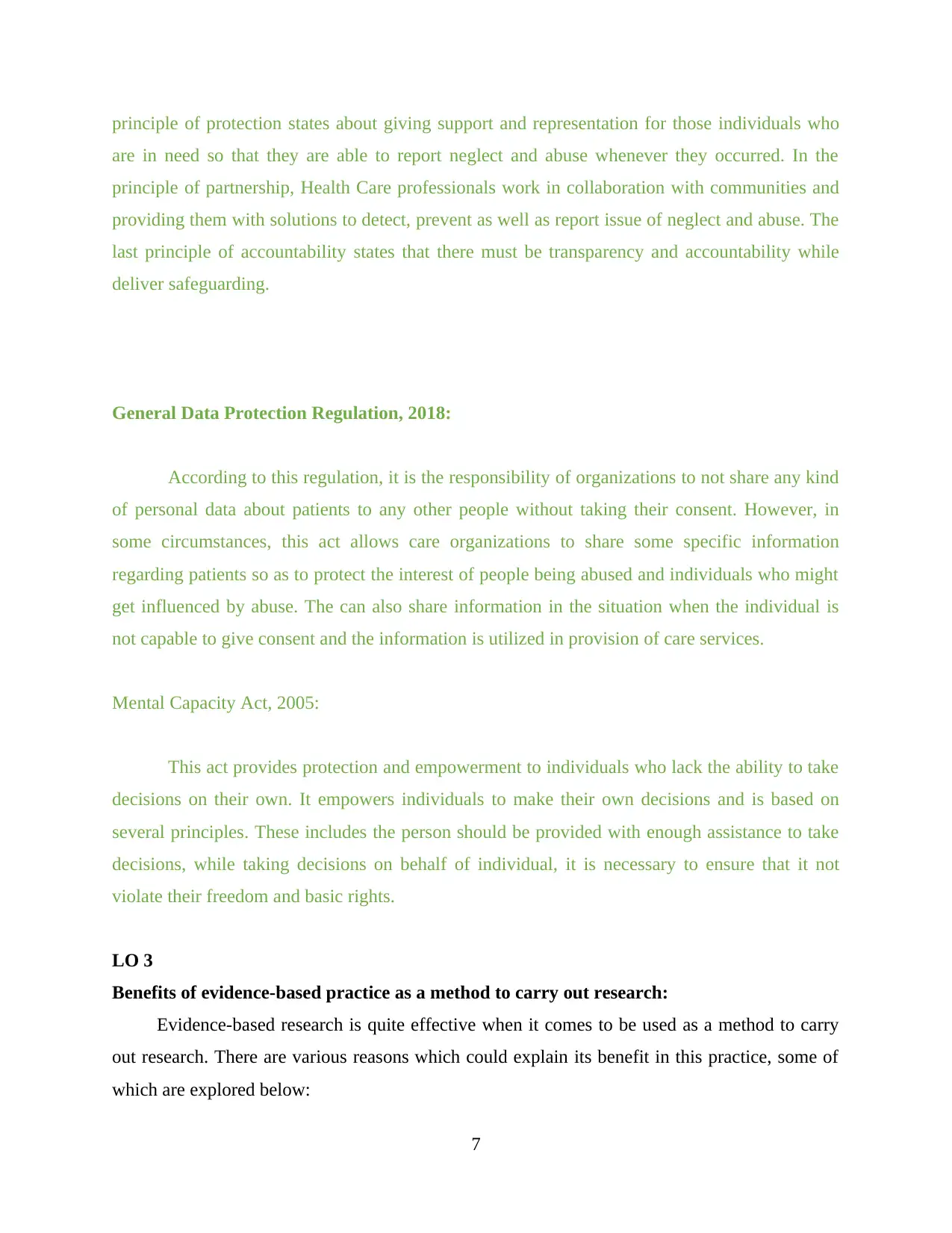
principle of protection states about giving support and representation for those individuals who
are in need so that they are able to report neglect and abuse whenever they occurred. In the
principle of partnership, Health Care professionals work in collaboration with communities and
providing them with solutions to detect, prevent as well as report issue of neglect and abuse. The
last principle of accountability states that there must be transparency and accountability while
deliver safeguarding.
General Data Protection Regulation, 2018:
According to this regulation, it is the responsibility of organizations to not share any kind
of personal data about patients to any other people without taking their consent. However, in
some circumstances, this act allows care organizations to share some specific information
regarding patients so as to protect the interest of people being abused and individuals who might
get influenced by abuse. The can also share information in the situation when the individual is
not capable to give consent and the information is utilized in provision of care services.
Mental Capacity Act, 2005:
This act provides protection and empowerment to individuals who lack the ability to take
decisions on their own. It empowers individuals to make their own decisions and is based on
several principles. These includes the person should be provided with enough assistance to take
decisions, while taking decisions on behalf of individual, it is necessary to ensure that it not
violate their freedom and basic rights.
LO 3
Benefits of evidence-based practice as a method to carry out research:
Evidence-based research is quite effective when it comes to be used as a method to carry
out research. There are various reasons which could explain its benefit in this practice, some of
which are explored below:
7
are in need so that they are able to report neglect and abuse whenever they occurred. In the
principle of partnership, Health Care professionals work in collaboration with communities and
providing them with solutions to detect, prevent as well as report issue of neglect and abuse. The
last principle of accountability states that there must be transparency and accountability while
deliver safeguarding.
General Data Protection Regulation, 2018:
According to this regulation, it is the responsibility of organizations to not share any kind
of personal data about patients to any other people without taking their consent. However, in
some circumstances, this act allows care organizations to share some specific information
regarding patients so as to protect the interest of people being abused and individuals who might
get influenced by abuse. The can also share information in the situation when the individual is
not capable to give consent and the information is utilized in provision of care services.
Mental Capacity Act, 2005:
This act provides protection and empowerment to individuals who lack the ability to take
decisions on their own. It empowers individuals to make their own decisions and is based on
several principles. These includes the person should be provided with enough assistance to take
decisions, while taking decisions on behalf of individual, it is necessary to ensure that it not
violate their freedom and basic rights.
LO 3
Benefits of evidence-based practice as a method to carry out research:
Evidence-based research is quite effective when it comes to be used as a method to carry
out research. There are various reasons which could explain its benefit in this practice, some of
which are explored below:
7
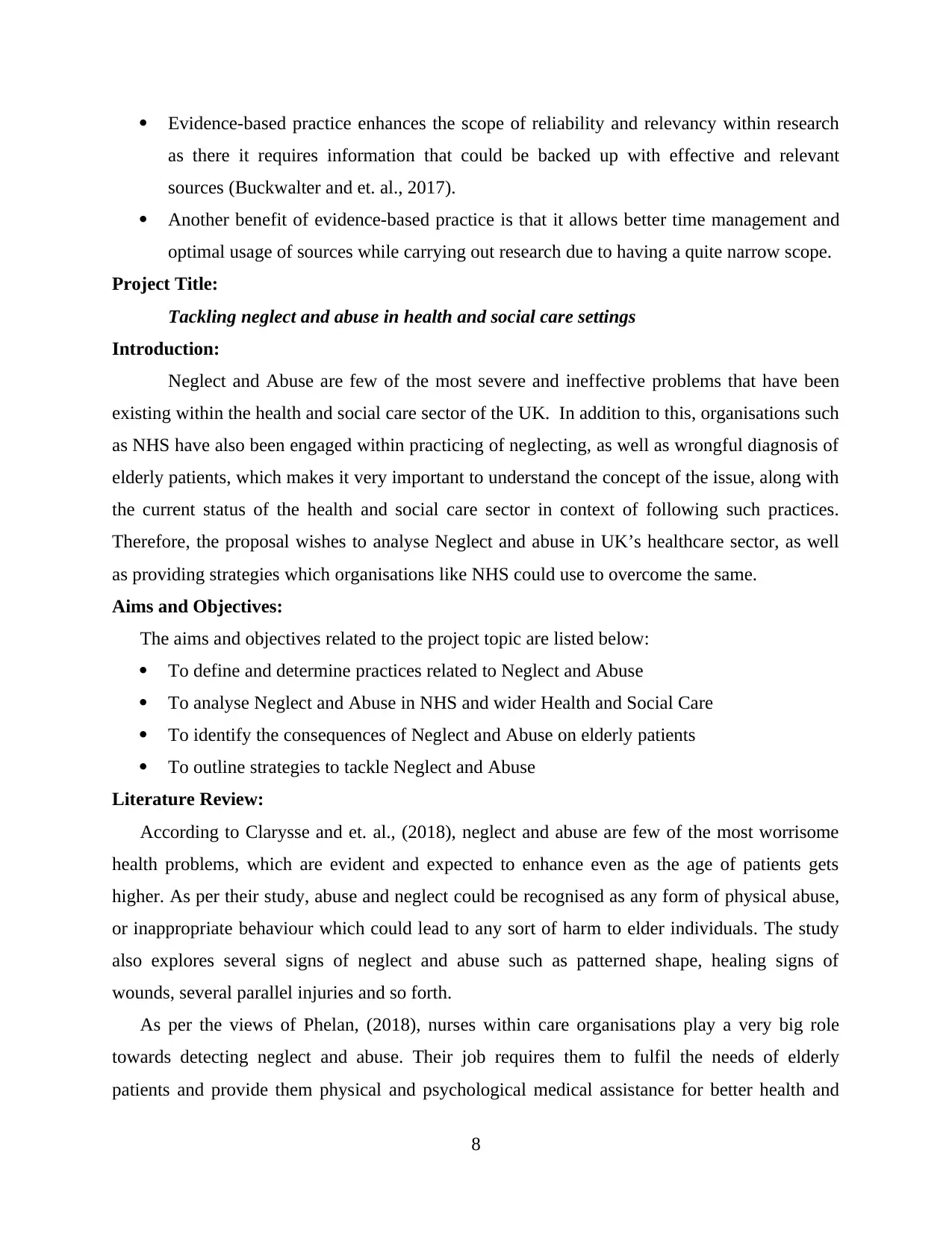
Evidence-based practice enhances the scope of reliability and relevancy within research
as there it requires information that could be backed up with effective and relevant
sources (Buckwalter and et. al., 2017).
Another benefit of evidence-based practice is that it allows better time management and
optimal usage of sources while carrying out research due to having a quite narrow scope.
Project Title:
Tackling neglect and abuse in health and social care settings
Introduction:
Neglect and Abuse are few of the most severe and ineffective problems that have been
existing within the health and social care sector of the UK. In addition to this, organisations such
as NHS have also been engaged within practicing of neglecting, as well as wrongful diagnosis of
elderly patients, which makes it very important to understand the concept of the issue, along with
the current status of the health and social care sector in context of following such practices.
Therefore, the proposal wishes to analyse Neglect and abuse in UK’s healthcare sector, as well
as providing strategies which organisations like NHS could use to overcome the same.
Aims and Objectives:
The aims and objectives related to the project topic are listed below:
To define and determine practices related to Neglect and Abuse
To analyse Neglect and Abuse in NHS and wider Health and Social Care
To identify the consequences of Neglect and Abuse on elderly patients
To outline strategies to tackle Neglect and Abuse
Literature Review:
According to Clarysse and et. al., (2018), neglect and abuse are few of the most worrisome
health problems, which are evident and expected to enhance even as the age of patients gets
higher. As per their study, abuse and neglect could be recognised as any form of physical abuse,
or inappropriate behaviour which could lead to any sort of harm to elder individuals. The study
also explores several signs of neglect and abuse such as patterned shape, healing signs of
wounds, several parallel injuries and so forth.
As per the views of Phelan, (2018), nurses within care organisations play a very big role
towards detecting neglect and abuse. Their job requires them to fulfil the needs of elderly
patients and provide them physical and psychological medical assistance for better health and
8
as there it requires information that could be backed up with effective and relevant
sources (Buckwalter and et. al., 2017).
Another benefit of evidence-based practice is that it allows better time management and
optimal usage of sources while carrying out research due to having a quite narrow scope.
Project Title:
Tackling neglect and abuse in health and social care settings
Introduction:
Neglect and Abuse are few of the most severe and ineffective problems that have been
existing within the health and social care sector of the UK. In addition to this, organisations such
as NHS have also been engaged within practicing of neglecting, as well as wrongful diagnosis of
elderly patients, which makes it very important to understand the concept of the issue, along with
the current status of the health and social care sector in context of following such practices.
Therefore, the proposal wishes to analyse Neglect and abuse in UK’s healthcare sector, as well
as providing strategies which organisations like NHS could use to overcome the same.
Aims and Objectives:
The aims and objectives related to the project topic are listed below:
To define and determine practices related to Neglect and Abuse
To analyse Neglect and Abuse in NHS and wider Health and Social Care
To identify the consequences of Neglect and Abuse on elderly patients
To outline strategies to tackle Neglect and Abuse
Literature Review:
According to Clarysse and et. al., (2018), neglect and abuse are few of the most worrisome
health problems, which are evident and expected to enhance even as the age of patients gets
higher. As per their study, abuse and neglect could be recognised as any form of physical abuse,
or inappropriate behaviour which could lead to any sort of harm to elder individuals. The study
also explores several signs of neglect and abuse such as patterned shape, healing signs of
wounds, several parallel injuries and so forth.
As per the views of Phelan, (2018), nurses within care organisations play a very big role
towards detecting neglect and abuse. Their job requires them to fulfil the needs of elderly
patients and provide them physical and psychological medical assistance for better health and
8
⊘ This is a preview!⊘
Do you want full access?
Subscribe today to unlock all pages.

Trusted by 1+ million students worldwide
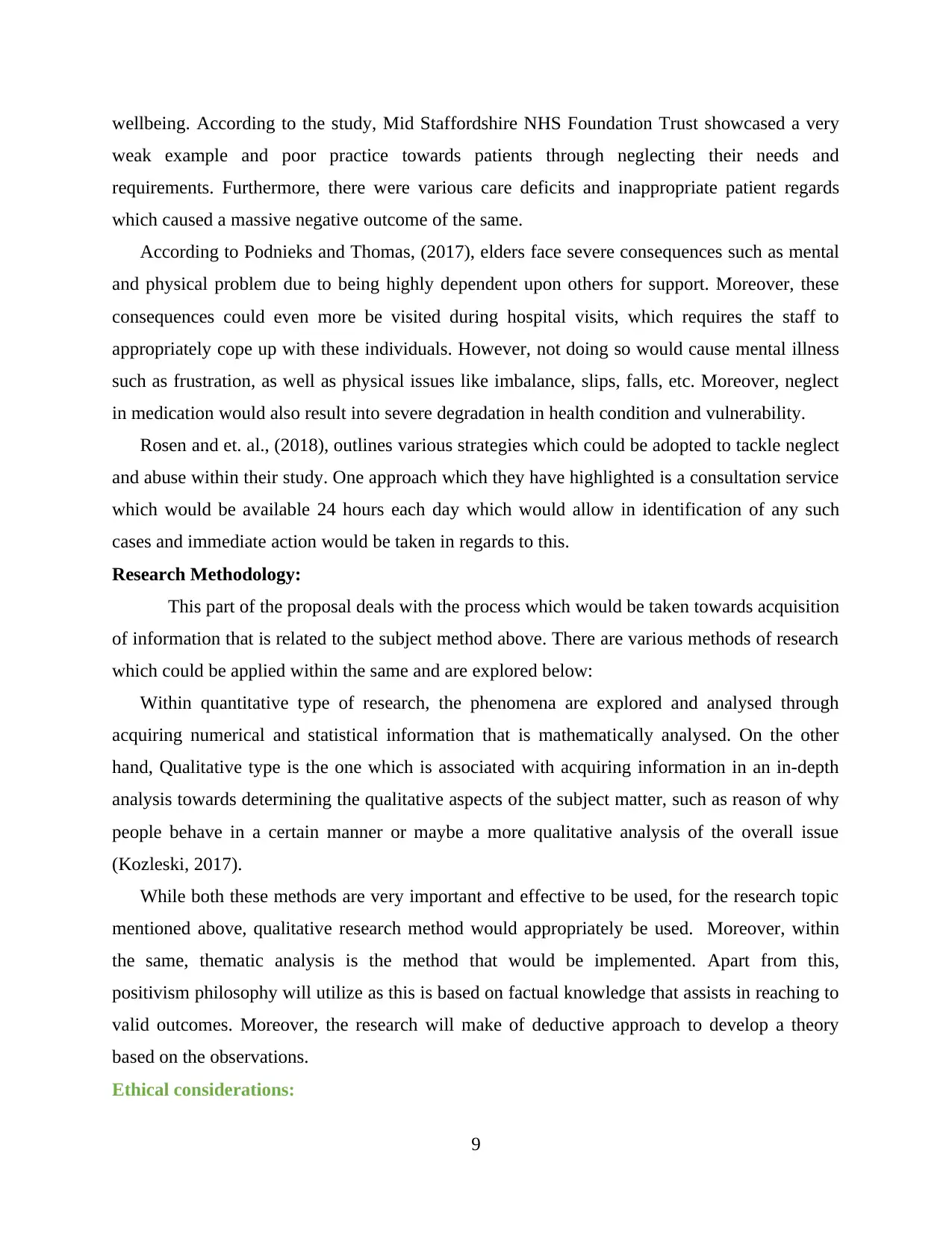
wellbeing. According to the study, Mid Staffordshire NHS Foundation Trust showcased a very
weak example and poor practice towards patients through neglecting their needs and
requirements. Furthermore, there were various care deficits and inappropriate patient regards
which caused a massive negative outcome of the same.
According to Podnieks and Thomas, (2017), elders face severe consequences such as mental
and physical problem due to being highly dependent upon others for support. Moreover, these
consequences could even more be visited during hospital visits, which requires the staff to
appropriately cope up with these individuals. However, not doing so would cause mental illness
such as frustration, as well as physical issues like imbalance, slips, falls, etc. Moreover, neglect
in medication would also result into severe degradation in health condition and vulnerability.
Rosen and et. al., (2018), outlines various strategies which could be adopted to tackle neglect
and abuse within their study. One approach which they have highlighted is a consultation service
which would be available 24 hours each day which would allow in identification of any such
cases and immediate action would be taken in regards to this.
Research Methodology:
This part of the proposal deals with the process which would be taken towards acquisition
of information that is related to the subject method above. There are various methods of research
which could be applied within the same and are explored below:
Within quantitative type of research, the phenomena are explored and analysed through
acquiring numerical and statistical information that is mathematically analysed. On the other
hand, Qualitative type is the one which is associated with acquiring information in an in-depth
analysis towards determining the qualitative aspects of the subject matter, such as reason of why
people behave in a certain manner or maybe a more qualitative analysis of the overall issue
(Kozleski, 2017).
While both these methods are very important and effective to be used, for the research topic
mentioned above, qualitative research method would appropriately be used. Moreover, within
the same, thematic analysis is the method that would be implemented. Apart from this,
positivism philosophy will utilize as this is based on factual knowledge that assists in reaching to
valid outcomes. Moreover, the research will make of deductive approach to develop a theory
based on the observations.
Ethical considerations:
9
weak example and poor practice towards patients through neglecting their needs and
requirements. Furthermore, there were various care deficits and inappropriate patient regards
which caused a massive negative outcome of the same.
According to Podnieks and Thomas, (2017), elders face severe consequences such as mental
and physical problem due to being highly dependent upon others for support. Moreover, these
consequences could even more be visited during hospital visits, which requires the staff to
appropriately cope up with these individuals. However, not doing so would cause mental illness
such as frustration, as well as physical issues like imbalance, slips, falls, etc. Moreover, neglect
in medication would also result into severe degradation in health condition and vulnerability.
Rosen and et. al., (2018), outlines various strategies which could be adopted to tackle neglect
and abuse within their study. One approach which they have highlighted is a consultation service
which would be available 24 hours each day which would allow in identification of any such
cases and immediate action would be taken in regards to this.
Research Methodology:
This part of the proposal deals with the process which would be taken towards acquisition
of information that is related to the subject method above. There are various methods of research
which could be applied within the same and are explored below:
Within quantitative type of research, the phenomena are explored and analysed through
acquiring numerical and statistical information that is mathematically analysed. On the other
hand, Qualitative type is the one which is associated with acquiring information in an in-depth
analysis towards determining the qualitative aspects of the subject matter, such as reason of why
people behave in a certain manner or maybe a more qualitative analysis of the overall issue
(Kozleski, 2017).
While both these methods are very important and effective to be used, for the research topic
mentioned above, qualitative research method would appropriately be used. Moreover, within
the same, thematic analysis is the method that would be implemented. Apart from this,
positivism philosophy will utilize as this is based on factual knowledge that assists in reaching to
valid outcomes. Moreover, the research will make of deductive approach to develop a theory
based on the observations.
Ethical considerations:
9
Paraphrase This Document
Need a fresh take? Get an instant paraphrase of this document with our AI Paraphraser
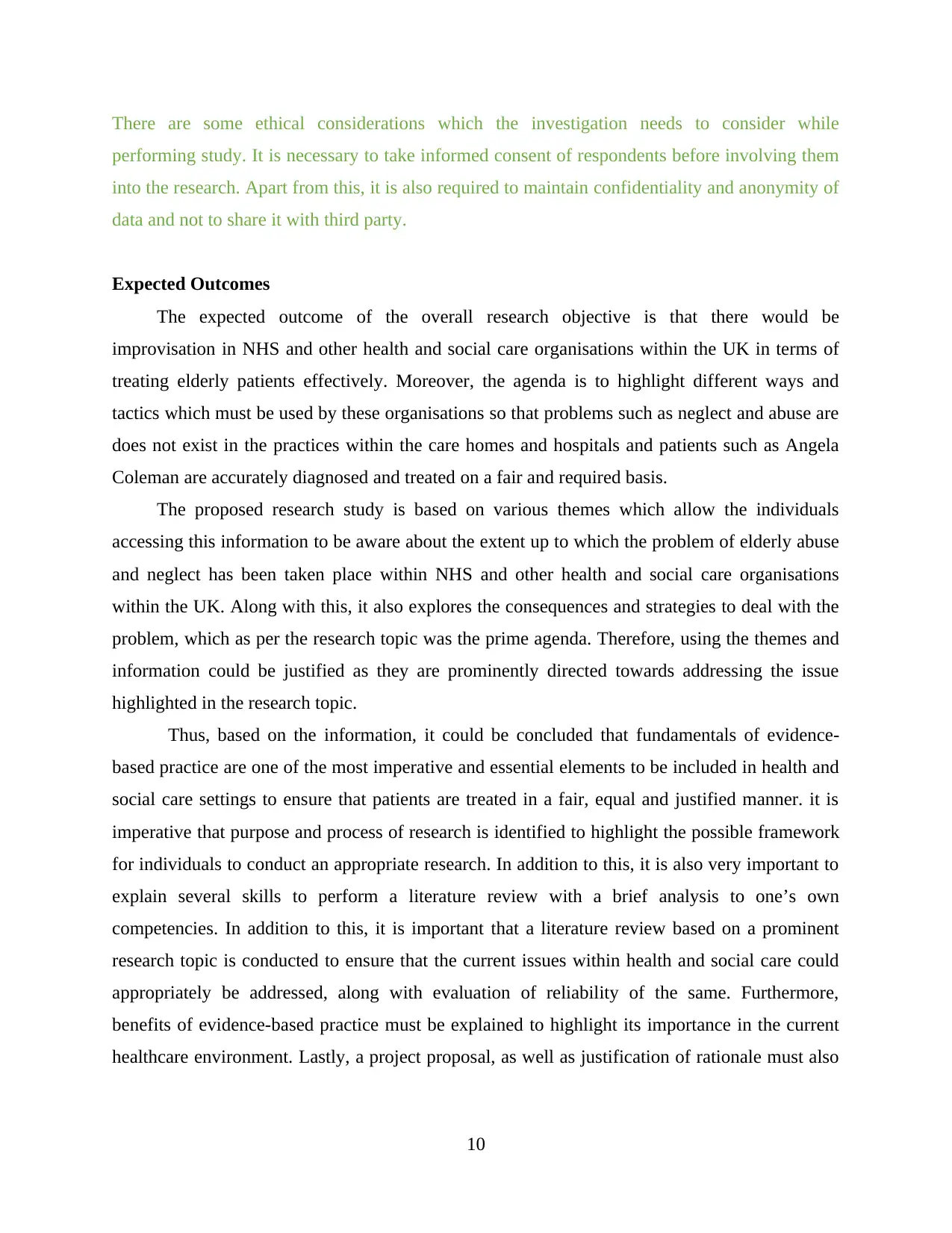
There are some ethical considerations which the investigation needs to consider while
performing study. It is necessary to take informed consent of respondents before involving them
into the research. Apart from this, it is also required to maintain confidentiality and anonymity of
data and not to share it with third party.
Expected Outcomes
The expected outcome of the overall research objective is that there would be
improvisation in NHS and other health and social care organisations within the UK in terms of
treating elderly patients effectively. Moreover, the agenda is to highlight different ways and
tactics which must be used by these organisations so that problems such as neglect and abuse are
does not exist in the practices within the care homes and hospitals and patients such as Angela
Coleman are accurately diagnosed and treated on a fair and required basis.
The proposed research study is based on various themes which allow the individuals
accessing this information to be aware about the extent up to which the problem of elderly abuse
and neglect has been taken place within NHS and other health and social care organisations
within the UK. Along with this, it also explores the consequences and strategies to deal with the
problem, which as per the research topic was the prime agenda. Therefore, using the themes and
information could be justified as they are prominently directed towards addressing the issue
highlighted in the research topic.
Thus, based on the information, it could be concluded that fundamentals of evidence-
based practice are one of the most imperative and essential elements to be included in health and
social care settings to ensure that patients are treated in a fair, equal and justified manner. it is
imperative that purpose and process of research is identified to highlight the possible framework
for individuals to conduct an appropriate research. In addition to this, it is also very important to
explain several skills to perform a literature review with a brief analysis to one’s own
competencies. In addition to this, it is important that a literature review based on a prominent
research topic is conducted to ensure that the current issues within health and social care could
appropriately be addressed, along with evaluation of reliability of the same. Furthermore,
benefits of evidence-based practice must be explained to highlight its importance in the current
healthcare environment. Lastly, a project proposal, as well as justification of rationale must also
10
performing study. It is necessary to take informed consent of respondents before involving them
into the research. Apart from this, it is also required to maintain confidentiality and anonymity of
data and not to share it with third party.
Expected Outcomes
The expected outcome of the overall research objective is that there would be
improvisation in NHS and other health and social care organisations within the UK in terms of
treating elderly patients effectively. Moreover, the agenda is to highlight different ways and
tactics which must be used by these organisations so that problems such as neglect and abuse are
does not exist in the practices within the care homes and hospitals and patients such as Angela
Coleman are accurately diagnosed and treated on a fair and required basis.
The proposed research study is based on various themes which allow the individuals
accessing this information to be aware about the extent up to which the problem of elderly abuse
and neglect has been taken place within NHS and other health and social care organisations
within the UK. Along with this, it also explores the consequences and strategies to deal with the
problem, which as per the research topic was the prime agenda. Therefore, using the themes and
information could be justified as they are prominently directed towards addressing the issue
highlighted in the research topic.
Thus, based on the information, it could be concluded that fundamentals of evidence-
based practice are one of the most imperative and essential elements to be included in health and
social care settings to ensure that patients are treated in a fair, equal and justified manner. it is
imperative that purpose and process of research is identified to highlight the possible framework
for individuals to conduct an appropriate research. In addition to this, it is also very important to
explain several skills to perform a literature review with a brief analysis to one’s own
competencies. In addition to this, it is important that a literature review based on a prominent
research topic is conducted to ensure that the current issues within health and social care could
appropriately be addressed, along with evaluation of reliability of the same. Furthermore,
benefits of evidence-based practice must be explained to highlight its importance in the current
healthcare environment. Lastly, a project proposal, as well as justification of rationale must also
10
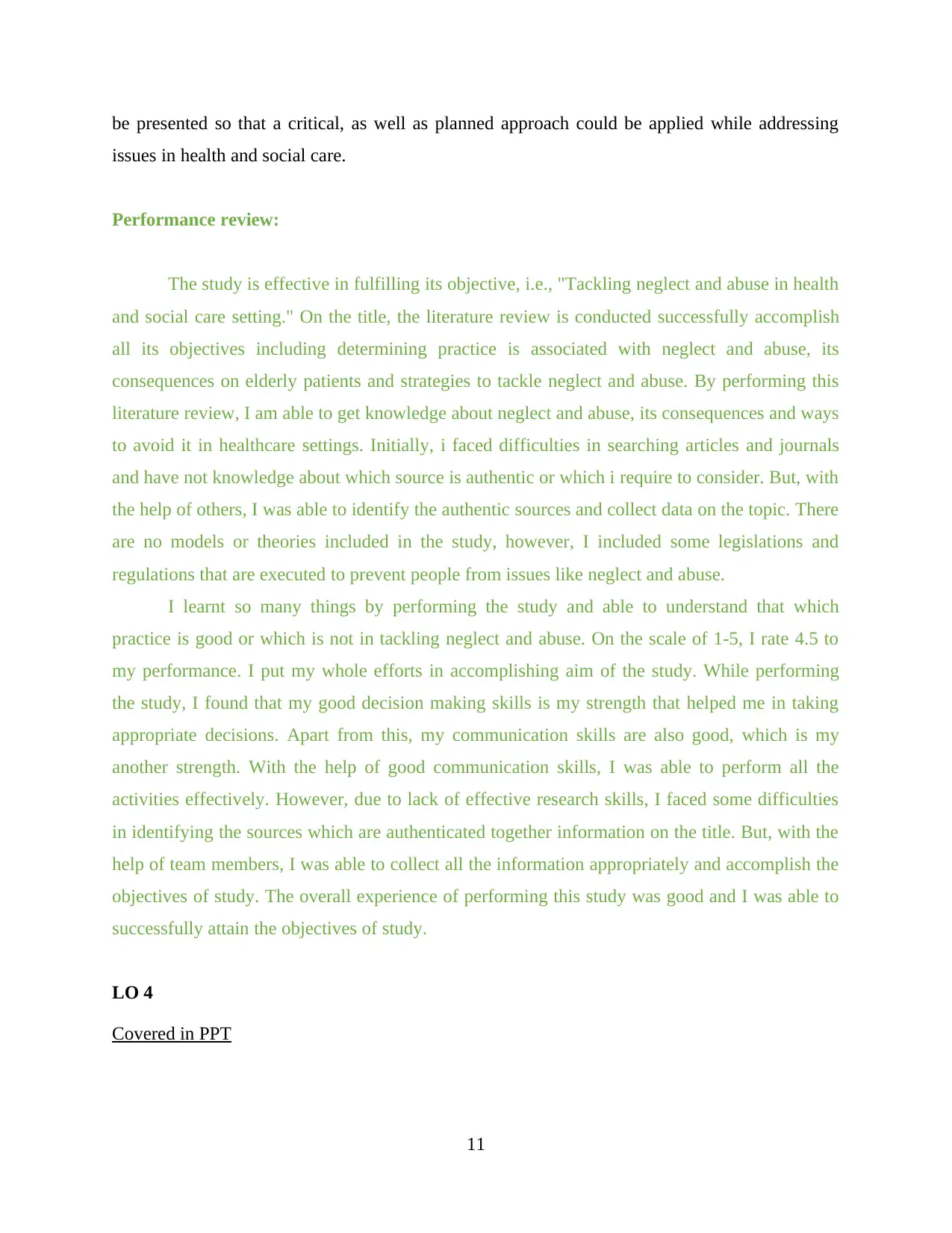
be presented so that a critical, as well as planned approach could be applied while addressing
issues in health and social care.
Performance review:
The study is effective in fulfilling its objective, i.e., "Tackling neglect and abuse in health
and social care setting." On the title, the literature review is conducted successfully accomplish
all its objectives including determining practice is associated with neglect and abuse, its
consequences on elderly patients and strategies to tackle neglect and abuse. By performing this
literature review, I am able to get knowledge about neglect and abuse, its consequences and ways
to avoid it in healthcare settings. Initially, i faced difficulties in searching articles and journals
and have not knowledge about which source is authentic or which i require to consider. But, with
the help of others, I was able to identify the authentic sources and collect data on the topic. There
are no models or theories included in the study, however, I included some legislations and
regulations that are executed to prevent people from issues like neglect and abuse.
I learnt so many things by performing the study and able to understand that which
practice is good or which is not in tackling neglect and abuse. On the scale of 1-5, I rate 4.5 to
my performance. I put my whole efforts in accomplishing aim of the study. While performing
the study, I found that my good decision making skills is my strength that helped me in taking
appropriate decisions. Apart from this, my communication skills are also good, which is my
another strength. With the help of good communication skills, I was able to perform all the
activities effectively. However, due to lack of effective research skills, I faced some difficulties
in identifying the sources which are authenticated together information on the title. But, with the
help of team members, I was able to collect all the information appropriately and accomplish the
objectives of study. The overall experience of performing this study was good and I was able to
successfully attain the objectives of study.
LO 4
Covered in PPT
11
issues in health and social care.
Performance review:
The study is effective in fulfilling its objective, i.e., "Tackling neglect and abuse in health
and social care setting." On the title, the literature review is conducted successfully accomplish
all its objectives including determining practice is associated with neglect and abuse, its
consequences on elderly patients and strategies to tackle neglect and abuse. By performing this
literature review, I am able to get knowledge about neglect and abuse, its consequences and ways
to avoid it in healthcare settings. Initially, i faced difficulties in searching articles and journals
and have not knowledge about which source is authentic or which i require to consider. But, with
the help of others, I was able to identify the authentic sources and collect data on the topic. There
are no models or theories included in the study, however, I included some legislations and
regulations that are executed to prevent people from issues like neglect and abuse.
I learnt so many things by performing the study and able to understand that which
practice is good or which is not in tackling neglect and abuse. On the scale of 1-5, I rate 4.5 to
my performance. I put my whole efforts in accomplishing aim of the study. While performing
the study, I found that my good decision making skills is my strength that helped me in taking
appropriate decisions. Apart from this, my communication skills are also good, which is my
another strength. With the help of good communication skills, I was able to perform all the
activities effectively. However, due to lack of effective research skills, I faced some difficulties
in identifying the sources which are authenticated together information on the title. But, with the
help of team members, I was able to collect all the information appropriately and accomplish the
objectives of study. The overall experience of performing this study was good and I was able to
successfully attain the objectives of study.
LO 4
Covered in PPT
11
⊘ This is a preview!⊘
Do you want full access?
Subscribe today to unlock all pages.

Trusted by 1+ million students worldwide
1 out of 13
Related Documents
Your All-in-One AI-Powered Toolkit for Academic Success.
+13062052269
info@desklib.com
Available 24*7 on WhatsApp / Email
![[object Object]](/_next/static/media/star-bottom.7253800d.svg)
Unlock your academic potential
Copyright © 2020–2026 A2Z Services. All Rights Reserved. Developed and managed by ZUCOL.





